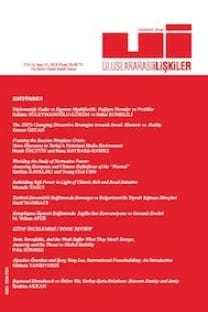Tarihsel Sosyoloji ve Uluslararası İlişkiler: Jeopolitik, Kapitalizm ve Devletler Sistemi
Bu makale uluslararası ilişkiler kuramında son yıllarda giderek disiplinin temel gündemini oluşturmaya başlayan tarihsel sosyoloji ve uluslararası ilişkiler kuramı arasındaki ilişkiyi incelemektedir. Bu çerçevede tarihsel sosyolojinin geçirmiş olduğu aşamaları ve temel tartışmaların bir analizini yapmaktadır. Tarihsel sosyoloji çalışmaları 1970’li yıllarda Weber’in görüşlerinin hâkim olduğu bir dönemden sonra bugün daha çok tarihsel materyalist yaklaşımların ağırlıklı olduğu bir aşamaya gelmiştir. Bu tartışmaların odak noktası “uluslararası”na tarihsel materyalist bir yaklaşımın nasıl geliştirileceğidir. Konuyla ilgili tartışmalar kapitalizm-devletler sistemi ilişkisi ile uluslararasını tanımlamak için kullanılan eşitsiz ve birleşik gelişme (EBG) kavramları etrafında yoğunlaşmıştır. Makalede bu tartışmalar tanıtılmakta ve sonuç bölümünde tarihsel sosyoloji çalışmalarının uluslararası ilişkiler kuramı açısından önemi ve potansiyel katkıları vurgulanmaktadır.
Anahtar Kelimeler:
Tarihsel Sosyoloji, Kapitalizm ve Devletler Sistemi, Tarihsel Materyalizm, Eşitsiz ve Bileşik Gelişme (EBG), Yeni-Weberci Yaklaşımlar.
Historical Sociology and International Relations: Geopolitics, Capitalism and State System
This article attempts to critically adress the development of the relation between historical sociology and international relations theory. It evaluates the main stages of the historical sociological approaches in IR and the main issues of contention. Historical sociological approaches to IR have evolved from a Weberian stage in 1970s and 80s to a point where it is heavily dominated by historical materialist approaches today. The focus of these debates is to develop a historical materialist undersanding of the “international” so far dominated by ahistorical and positivist conceptions. The article discusses the relation between capitalism and the state system and the concept of uneven and combined development (UCD) as the major points of discussion within the historical materialist historical sociology. The article concludes by adressing some of the crucial issues of contention for the future development of a historical sociological analysis of IR.
Keywords:
Historical Sociology, Capitalism and the State System, Historical Materialism, Unequal and Combined Development (UCD), Neo-Weberian Approaches to Historical Sociology,
___
- .....
- ISSN: 1304-7310
- Başlangıç: 2004
- Yayıncı: Uluslararası İlişkiler Konseyi Derneği İktisadi İşletmesi
